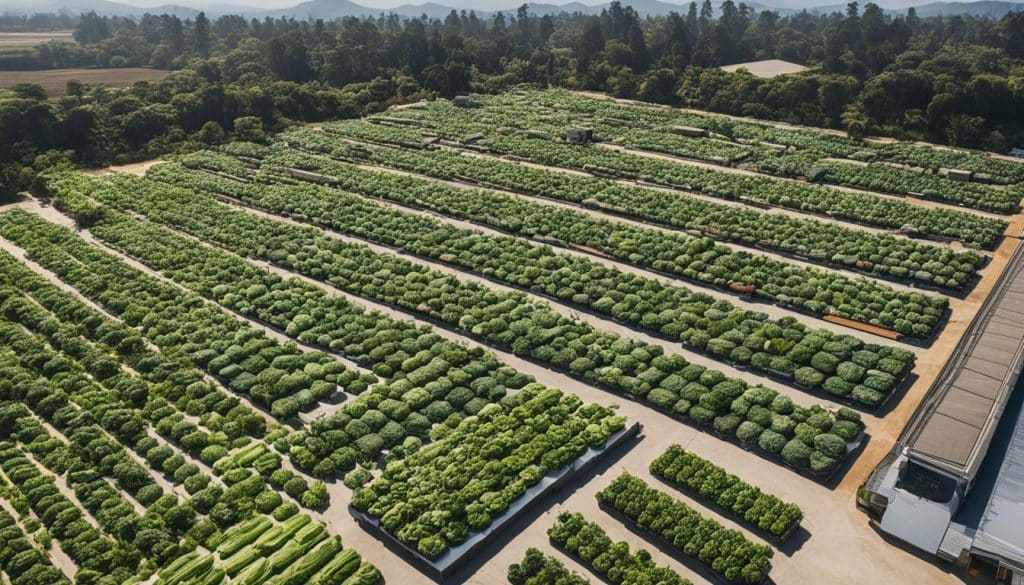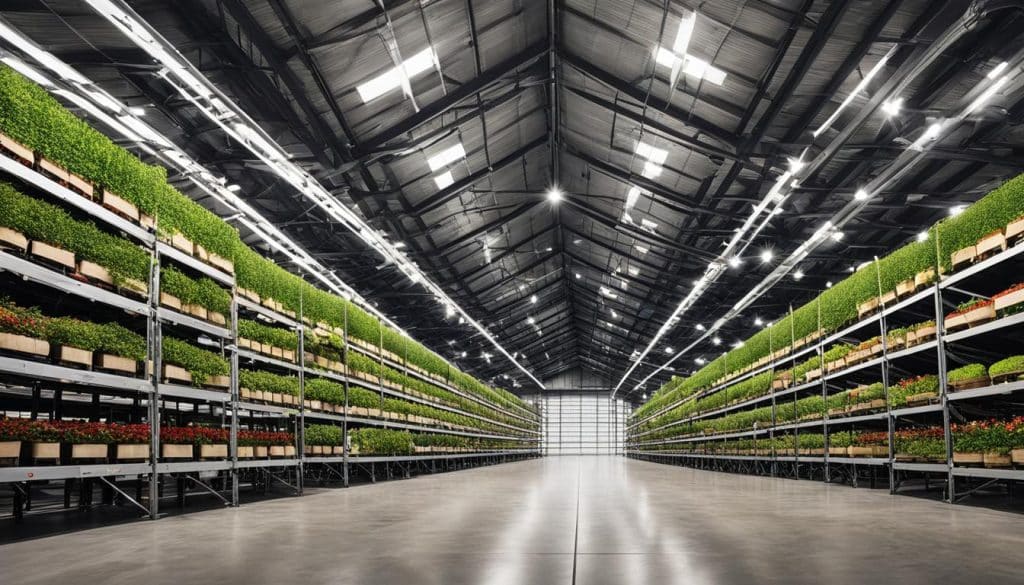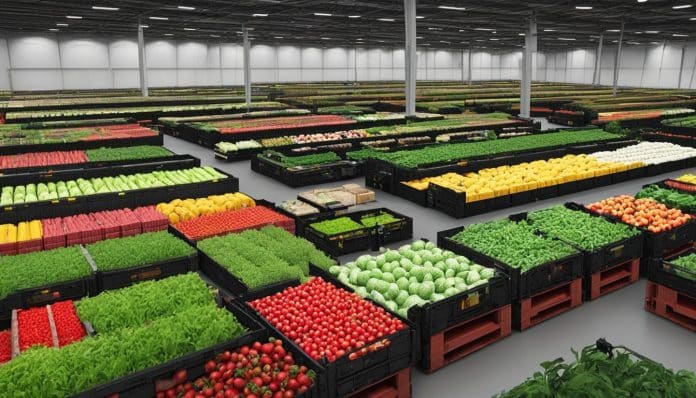Are you looking to maximize the efficiency and profitability of your farming operations? Look no further than a commercial agriculture warehouse. Having a well-designed and properly equipped agriculture warehouse can offer a range of benefits for farmers and agribusinesses in the Philippines.
With specialized storage facilities for perishable produce and advanced climate control and preservation technologies, a commercial agriculture warehouse allows you to optimize your storage management practices. By implementing warehouse management systems and strategies for maximizing space and minimizing waste, you can ensure that your farming operations are running smoothly.
Not only that, but sustainable agricultural warehousing solutions promote eco-friendly practices and the conservation of renewable energy and resources. By choosing a commercial agriculture warehouse, you are taking a step towards a more environmentally friendly and sustainable farming industry.
Whether you are a small-scale farmer or a large agribusiness, optimizing your farming practices with a commercial agriculture warehouse can make a significant difference. So, why wait? Take advantage of the benefits offered by a commercial agriculture warehouse and see your farming operations thrive.
Table of Contents

Introduction to Commercial Agriculture Warehousing
Commercial agriculture warehousing plays a crucial role in modern agriculture by providing farmers and agribusinesses with a centralized and efficient storage solution for their agricultural products. These warehouses serve as hubs for storing, organizing, and distributing produce, ensuring that farmers have sufficient space to store their crops and manage their inventory effectively.
By utilizing commercial agriculture warehousing, farmers can benefit from increased operational efficiency, improved product quality, reduced post-harvest losses, and enhanced market access. These advantages ultimately lead to higher profitability and sustainability for both farmers and agribusinesses.
Key Features of Agricultural Warehouses
Agricultural warehouses are equipped with key features that are specifically designed to optimize storage and preservation practices for different types of agricultural products. These specialized storage facilities play a crucial role in ensuring the freshness and quality of produce while maximizing storage efficiency.

- Temperature-Controlled Rooms: Agricultural warehouses incorporate temperature-controlled rooms that are ideal for storing perishable items such as fruits and vegetables. These rooms are equipped with advanced cooling systems that maintain the optimal temperature and humidity levels, ensuring the longevity of produce.
- Cold Storage Facilities: For products that require low temperatures, agricultural warehouses provide cold storage facilities. These facilities are specifically designed to preserve the freshness and quality of items like meat, dairy products, and frozen produce.
- Climate Control Technologies: Modern agricultural warehouses integrate advanced climate control technologies to create the ideal storage environment. Automated ventilation systems, humidity control mechanisms, and ethylene management systems help regulate atmospheric conditions and minimize spoilage.
- Inventory Management Systems: Efficient inventory management is essential for maximizing storage space and minimizing waste. Agricultural warehouses are equipped with smart inventory systems, including barcode scanning and tracking technologies, to streamline inventory management processes and reduce errors.
By leveraging these key features, agricultural warehouses provide farmers and agribusinesses with specialized storage solutions that optimize product preservation and enhance overall storage management practices.
Modern Challenges for Profitable Farming and the Role of Agriculture Warehousing
Profitable farming in today’s agricultural landscape is not without its challenges. Farmers face various obstacles that can significantly impact their profitability and overall efficiency. Key challenges include:
- Inflation: Fluctuating prices of inputs, such as seeds, fertilizers, and machinery, can increase production costs and reduce profitability.
- Supply chain issues: Disruptions in the supply chain, such as delays in transportation or logistical bottlenecks, can lead to lower market access and potential product spoilage.
- Climate change: Rising temperatures, changing rainfall patterns, and extreme weather events pose significant risks to crop yields, soil fertility, and overall farm productivity.
- COVID-19 pandemic: The ongoing pandemic has disrupted global trade, labor availability, and market demand, impacting farmers’ ability to sell their produce and manage their operations efficiently.
To overcome these modern challenges, farmers need innovative solutions that can help maintain profitability and increase efficiency. This is where agriculture warehousing plays a crucial role.
Agriculture warehousing provides farmers with reliable storage solutions that address the challenges mentioned above. By utilizing well-designed agriculture warehouses, farmers can:
- Minimize post-harvest losses: Proper storage and preservation techniques offered by agriculture warehouses help reduce spoilage and maintain the quality of the produce.
- Improve inventory management: Commercial agriculture warehouses provide farmers with efficient inventory management systems, enabling them to track, organize, and optimize their storage practices.
- Ensure product quality: Specialized storage facilities, such as temperature-controlled rooms, help maintain optimal conditions for different types of agricultural products, ensuring their quality and increasing market value.
By having access to the right agriculture warehouse, farmers can optimize their operations, mitigate risks, and overcome the modern challenges they face. Effective storage management and preservation practices provided by agriculture warehousing contribute to increased profitability and long-term sustainability in farming.
Innovations in Crop Production and Management for Storage Efficiency
The field of agriculture is constantly evolving, driven by innovations in crop production and management techniques. These advancements are aimed at improving storage efficiency and helping farmers optimize their agricultural operations. From precision farming technologies to vertical farming systems and sustainable irrigation practices, these innovations have revolutionized the way crops are grown, managed, and stored.
One of the key innovations in crop production is precision farming technologies. These technologies enable farmers to monitor and manage crop conditions more effectively, resulting in reduced post-harvest losses. By using real-time data on factors such as soil moisture, nutrient levels, and weather patterns, farmers can make data-driven decisions to improve crop yield and quality. This not only benefits the overall productivity of the farm but also contributes to better storage efficiency by ensuring optimal conditions for storage.
Vertical farming systems have also emerged as an innovative solution in crop production and storage management. With limited land availability and increasing urbanization, vertical farming offers a space-efficient solution for cultivating crops. By stacking plants vertically in a controlled environment, farmers can maximize their production capacity while minimizing the need for land. This allows for more efficient use of agricultural space and streamlines storage processes by ensuring a compact and accessible setup.
Furthermore, sustainable irrigation practices play a crucial role in crop production and storage efficiency. Water is a valuable resource in agriculture, and efficient irrigation techniques help conserve water while maintaining crop health. Innovations such as drip irrigation and smart irrigation systems enable farmers to deliver water directly to the roots of plants, minimizing water wastage and reducing the risk of disease and spoilage. By implementing these sustainable irrigation practices, farmers can optimize the use of water resources and improve the shelf life of their produce.

These innovations in crop production and management techniques can greatly enhance farmers’ storage efficiency. By embracing precision farming technologies, vertical farming systems, and sustainable irrigation practices, farmers can increase crop yield and quality and improve post-harvest storage practices. Adopting these innovative practices allows farmers to optimize storage efficiency, extend the shelf life of their produce, and ultimately contribute to the overall profitability and sustainability of their agricultural operations.
Efficient Inventory and Storage Management Practices
Efficient inventory and storage management practices are essential for optimizing the use of agriculture warehouses. You can streamline inventory management processes, minimize errors, and improve overall efficiency by implementing smart inventory systems, such as barcode scanning and tracking technologies. These systems provide real-time insights, allowing you to track inventory levels accurately and make informed decisions about stock replenishment and order fulfillment.
Additionally, farmers can employ various strategies for maximizing space and minimizing waste within their agriculture warehouses. Implementing vertical storage solutions, such as shelving units and pallet racking systems, enables you to maximize the available vertical space. By utilizing advanced stacking techniques, you can efficiently utilize the available floor space and create organized storage areas.
Furthermore, advanced sorting and organization methods, such as categorizing products based on size, expiration dates, or customer demand, can enhance accessibility and ensure optimal space utilization. By implementing efficient inventory management practices, you can minimize the risk of product spoilage, reduce waste, and improve overall profitability and sustainability.
Agricultural management software can automate all the methods mentioned above. If you’re interested in finding one, check out our article about the best agriculture management system in the Philippines, which can serve as your guide.
Sustainable Agricultural Warehousing Solutions
When it comes to agriculture warehousing, sustainability is key. Sustainable agricultural warehousing solutions aim to promote eco-friendly practices and conserve renewable energy and resources. By adopting these practices, you can minimize the environmental impact of your warehousing operations while maximizing efficiency and profitability.
One important aspect of sustainable agriculture warehousing is implementing eco-friendly practices in storage. This includes using energy-efficient lighting and insulation to reduce energy consumption and implementing recycling and waste management systems to minimize waste. Additionally, utilizing renewable energy sources such as solar power can help reduce your carbon footprint and lower operating costs.
Resource conservation is another focus of sustainable warehousing solutions. By optimizing water usage and implementing sustainable farming practices, you can not only reduce your environmental impact but also improve your overall efficiency. Furthermore, reducing packaging waste through sustainable packaging materials and methods can contribute to a more environmentally friendly agricultural industry.
By embracing sustainable agricultural warehousing solutions, you can play a vital role in building an environmentally friendly and economically viable agricultural industry. Not only will you contribute to the conservation of resources and the reduction of greenhouse gas emissions, but you will also position yourself for long-term success in a market that increasingly values sustainability. So go ahead, make the choice to implement sustainable practices in your agricultural warehousing operations and reap the benefits for your business and the planet.



































